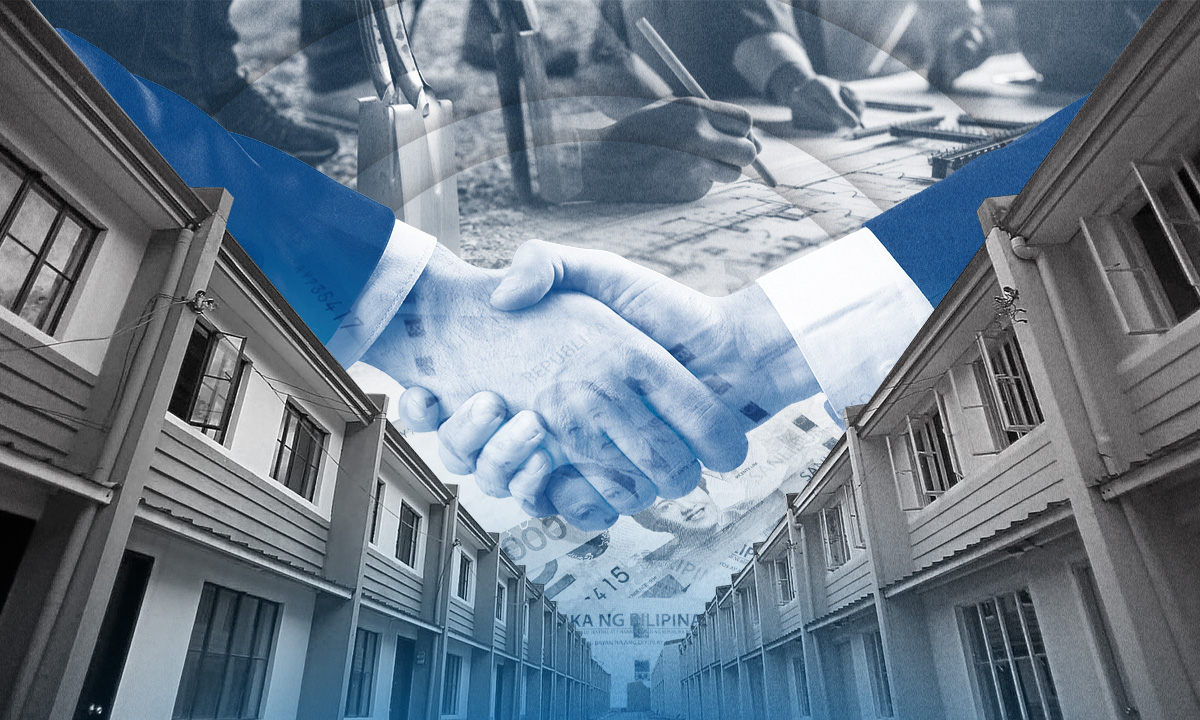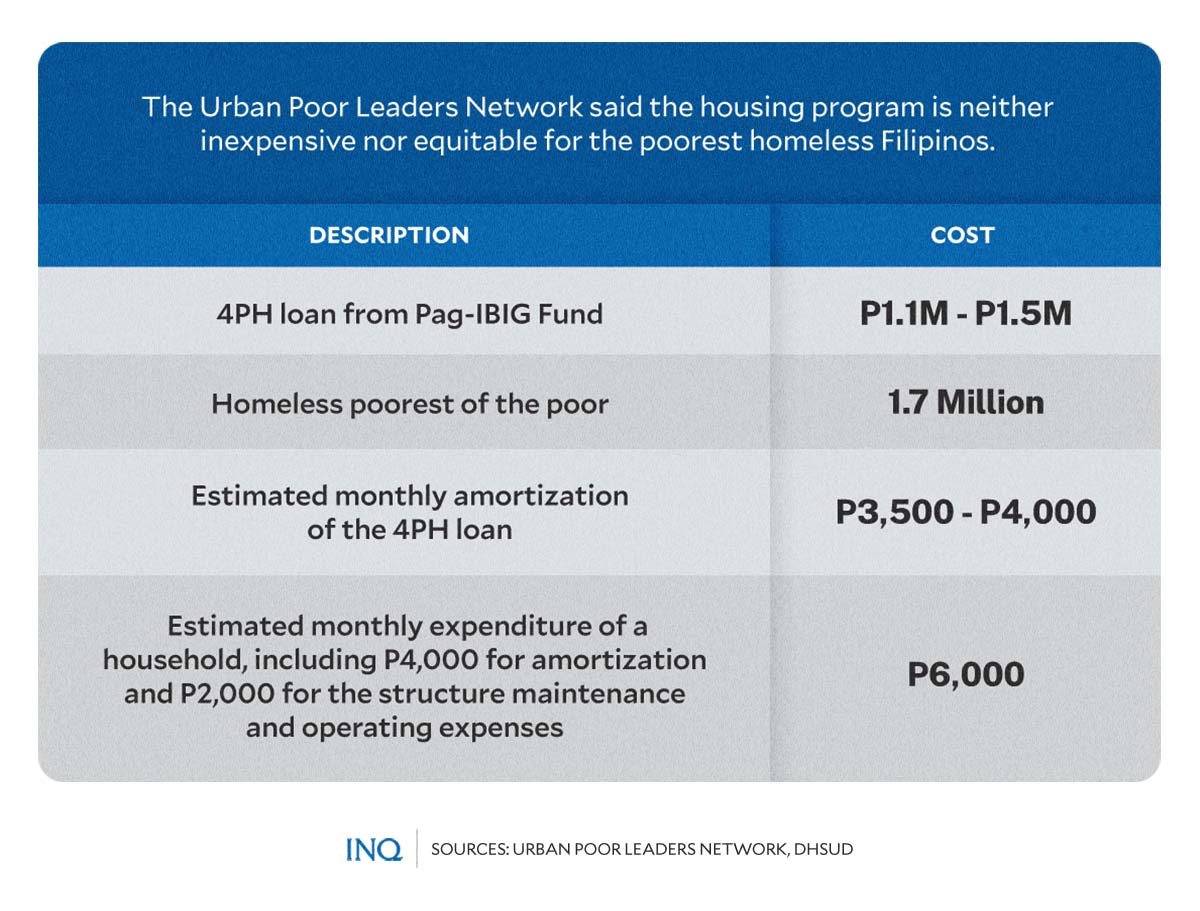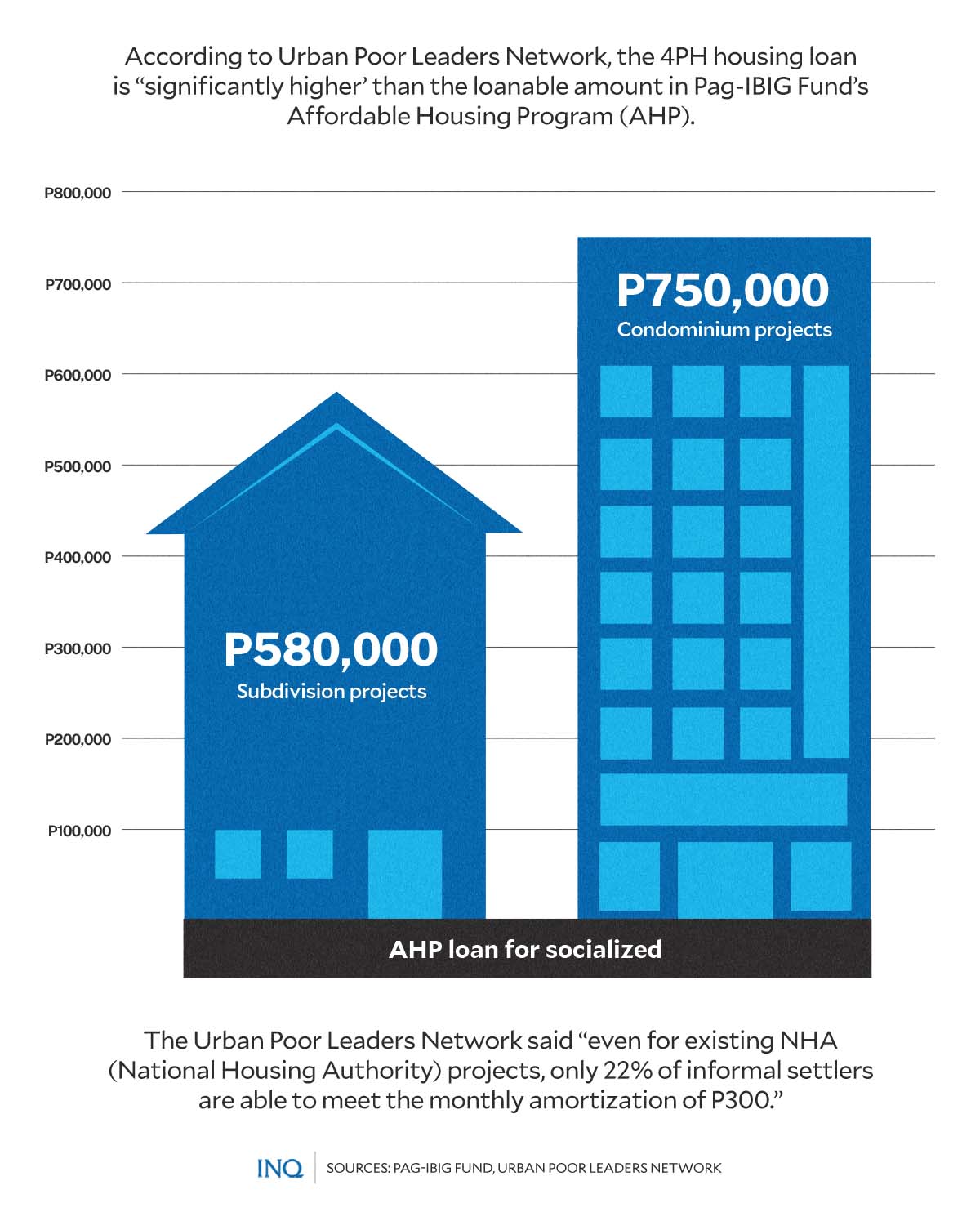4PH: Many still can’t afford P4,000 monthly housing payment
MANILA, Philippines—A laundress, 47-year-old Rose Catalan is paid P500 per set, but in a month, there are instances when there are only a few individuals who call her for work, leaving her struggling to make ends meet, especially for her children.
When she was told about a government program, the Pambansang Pabahay Para sa Pilipino (4PH), she said she was elated as she saw a ray of hope that she can soon have a house she can call her own.
She has been paying P3,500 a month for housing for almost five years now because she and her children are only renting a house in Sta. Ana, Manila. “We do not have our own home,” Catalan told INQUIRER.net via SMS.
Like her, 66-year-old Venus Peralta, an ukay-ukay vendor, who has been paying a P1,000-rent a month for 14 years now in Tatalon, Quezon City had hope, too, saying she even went to government offices to discuss what she can do to help to expedite the program.
However, as a coalition of urban poor leaders said, some 1.7 million poorest of the poor will be left out in the 4PH, a program that was stressed by President Ferdinand “Bongbong” Marcos Jr. in his second State of the Nation Address.
Marcos said in his speech on Monday (July 24) that the government will expand its housing program, especially for the poor, through the 4PH, which was declared as a “flagship program” when he issued Executive Order No. 34.
READ: Marcos names ‘Pambansang Pabahay’ or ‘4PH’ as his flagship program
The program, which was first launched last year, aims to address the 6.5 million housing backlog in the Philippines by building one million homes a year for six years, the Department of Human Settlements and Urban Development (DHSUD).
According to Marcos, “we already had groundbreaking in 25 areas in several parts of the country” and that “we have already signed the agreements to start the projects in over 100 locations.”
But the Urban Poor Leaders Network pointed out that the 4PH is “downright discriminatory against the poorest of the poor,” saying that it is neither affordable nor equitable for them, who need the program the most.
“It is possible that after six years, middle-income Filipinos will already have a home, but the poor will still not have a house they can call their own,” it said in a statement released on Sunday (July 23).
Still ‘out of reach’
Back in 2018, based on government data, 4.5 million people were either homeless or living in informal settlements all over the Philippines. Most of them, or 3 million, were in Metro Manila, which is home to over 13 million Filipinos.
According to Habitat for Humanity, the government’s housing laws and mechanisms for housing subsidy “have been deemed inadequate to resolve the rising deficit,” which, if not addressed, could go as high as 10.9 million by 2028.
This is what the 4PH aims to address.
READ: Gov’t pledges 1 million homes every year
However, the Urban Poor Leaders Network said “only the lower to middle-income families can avail the P1.1 to P1.5 million housing loan from Pag-IBIG [Fund] as the poorest of the poor […] cannot afford a monthly amortization of at least P4,000.”
Based on what the DHSUD previously said, instead of P8,000 a month, the monthly installment can be reduced to P3,500 to P4,000 through the help of an interest subsidy from the government.
As explained by the coalition, the interest rate imposed by Pag-IBIG Fund for socialized housing loans is three percent, but with an interest subsidy through the 4PH, only one percent shall be paid by the applicant.
‘Walang-wala’
However, the P4,000 is still too high, especially since applicants, who will later become occupants of the housing units, will have to pay for the maintenance and operating costs of the building, the Urban Poor Leaders Network said.
“Because the proposed housing design is high rise […] costs for the maintenance and operations of [the] said buildings, like elevators and other amenities, shall be borne collectively and may incur additional monthly dues of P2,000 per household,” the group said.
It said most of the poorest of the poor are informal settlers living in vulnerable conditions because most of them work in the informal economy with irregular, often meager, income that is hardly enough.
One of them is Catalan, who said “I cannot really afford the monthly amortization because my income is already not enough even for my family’s basic needs alone.” She is taking care of her three children.
Catalan said that in a week, she can earn P1,000 to P1,500, depending on how many customers will call her to do the work, which is often zero most of the time. “Every month, I have to provide for our needs and then the rent, so I really do not have savings.”
Peralta echoed Catalan’s words, saying that P4,000 a month is really too high. “We ask the government to make it as low as P1,000, so that we, the poorest of the poor, can avail of the housing units, too,” she said.
‘Significantly higher’
The Urban Poor Leaders Network pointed out that 4PH housing loans are “significantly higher” than present loanable amount of up to P750,000 for socialized housing through Pag-IBIG Fund’s Affordable Housing Program (AHP).
According to data from Pag-IBIG Fund, the AHP is available for members from low-income and minimum wage sector who earn up to P15,000 a month in Metro Manila and up to P12,000 a month outside the region.
As the coalition said, the monthly installment in AHP is way lower at P2,445.
Likewise, it said “records would show […] that even for existing NHA (National Housing Authority) projects, only 22 percent of informal settlers are able to meet the monthly amortization of P300.”
“P6,000 is 20 times higher than the current NHA cost, making the 4PH an impossible dream house for the poorest of the poor. The program has not even started but the poor are already disqualified,” the Urban Poor Leaders Network said.
Catalan stressed, “I only depend on whether there is someone who will call me for work, so I really hope that we, informal workers, will be equally viewed by the government and be given the privilege to avail of benefits workers in the formal economy can get.”
Realistic or not?
Jose de Guzman, a housing advocate, said the program’s implementation will rely mainly on local government units and is supported by the Pag-IBIG Fund, NHA, Social Housing Finance Corp., and the National Home Mortgage Finance Corp.
“The mortgage funds shall be provided by government financial institutions and private banks to ensure that the main issue of affordability and access to funds are properly addressed,” he said in an INQUIRER column.
READ: Is the ‘Pabahay’ target of one million houses a year realistic?
“Assuming a 100-percent loan to value ratio, “the mortgage funding per unit will require a total budget of P1 billion to finance a batch of 1,000 units. Therefore, one million units per year will require a mortgage funding budget of P1 trillion, or a total of P6 trillion for six years,” said De Guzman.
“There is a need to make sure that the promise can be delivered,” he said.
He also stressed data from previous years, which indicated that out of the total expected housing production of 200,000 a year, only an average of 140,000 housing units were actually built for the homeless.
He said, though, that the proposed National Land Use Act is critical in accelerating the production of affordable housing nationwide, particularly for the less privileged sector, including the homeless and informal settlers.
READ: How the proposed National Land Use Act can fast-track housing
‘We can help’
The Urban Poor Leaders Network said there is a “dire need” to address the housing crisis, so it is willing to work with the government with an alternative mechanism that it would like to propose.
“These include a major proposal for the government to make land acquisition and site development for socialized housing a grant to drive down the cost further and make the program more affordable for the poorest of the poor,” the group said.
As Peralta told INQUIRER.net via phone call, the government should heed their call if it really aims to address the housing backlog, which is a result of poverty, a problem that has been making life really hard for decades now.
“I call on the government to consider our conditions. Most of us are living hand-to-mouth,” Peralta said.
She said, too, that it would be better if the housing units they can get through the 4PH is within the area where their work is: “We need to work, of course, to be able to pay the monthly amortization.”
As earlier explained by Housing Secretary Jose Rizalino Acuzar, “as soon as they get their house, they need to pay because for every unpaid house, 10 Filipinos would not be able to get their own shelters.”
TSB
Subscribe to INQUIRER PLUS to get access to The Philippine Daily Inquirer & other 70+ titles, share up to 5 gadgets, listen to the news, download as early as 4am & share articles on social media. Call 896 6000.



